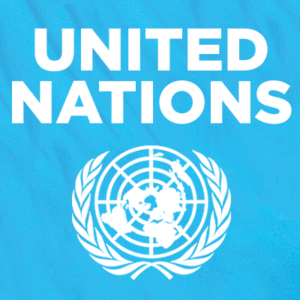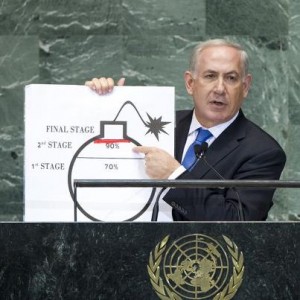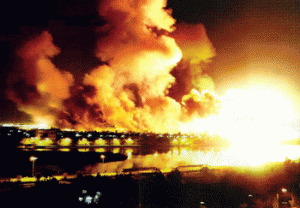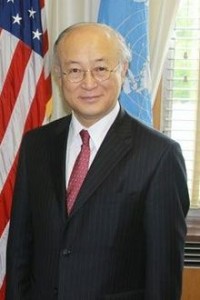U.N. Enablers of ‘Aggressive War’
Special Report: U.N. investigative reports, like a new one condemning Syria for alleged sarin use, are received as impartial and credible, but are often just more war propaganda from compromised bureaucrats, reports Robert Parry.
Many people still want to believe that the United Nations engages in impartial investigations and thus is more trustworthy than, say, self-interested governments, whether Russia or the United States. But trust in U.N. agencies is no longer well placed; whatever independence they may have once had has been broken, a reality relevant to recent “investigations” of Syrian chemical weapons use.

There is also the larger issue of the United Nations’ peculiar silence about one of its primary and original responsibilities, shouldered after the horrors of World War II – to stop wars of aggression, which today include “regime change” wars organized, funded and armed by the United States and other Western powers, such as the Iraq invasion in 2003, the overthrow of the Libyan government in 2011, and a series of proxy wars including the ongoing Syrian conflict.
After World War II, the Nuremberg Tribunals declared that a “war of aggression … is not only an international crime; it is the supreme international crime differing only from other war crimes in that it contains within itself the accumulated evil of the whole.”
That recognition became a guiding principle of the United Nations Charter, which specifically prohibits aggression or even threats of aggression against sovereign states.
The Charter declares in Article One that it is a chief U.N. purpose “to take effective collective measures … for the suppression of acts of aggression or other breaches of the peace.” Article Two, which defines the appropriate behavior of U.N. members, adds that “All Members shall refrain in their international relations from the threat or use of force against the territorial integrity or political independence of any state…”
However, instead of enforcing this fundamental rule, the United Nations has, in effect, caved in to the political and financial pressure brought to bear by the United States and its allies. A similar disregard for international law also pervades the U.S. mainstream media and much of the European and Israeli press as well.
There is an assumption that the United States and its allies have the right to intervene militarily anywhere in the world at anytime solely at their own discretion. Though U.S. diplomats and mainstream journalists still voice outrage when adversaries deviate from international law – such as denunciations of Russia over Ukraine’s civil war – there is silence or support when a U.S. president or, say, an Israeli prime minister orders military strikes inside another country. Then, we hear only justifications for these attacks.
Shielding Israel
For instance, on Friday, The New York Times published an article about Israel conducting a bombing raid inside Syria that reportedly killed two Syrians. The article is notable because it contains not a single reference to international law and Israel’s clear-cut violation of it. Instead, the article amounts to a lengthy rationalization for Israel’s aggression, framing the attacks as Israeli self-defense or, as the Times put it, “an escalation of Israel’s efforts to prevent its enemies from gaining access to sophisticated weapons.”

Israeli Prime Minister Benjamin Netanyahu at the United Nations in 2012, drawing his own “red line” on how far he will let Iran go in refining nuclear fuel.
The article also contains no reference to the fact that Israel maintains a sophisticated nuclear arsenal and is known to possess chemical and biological weapons as well. Implicit in the Times article is that the U.S. and Israel live under one set of rules while countries on the U.S.-Israeli enemies list must abide by another. Not to state the obvious but this is a clear violation of the journalistic principle of objectivity.
But the Times is far from alone in applying endless double standards. Hypocrisy now permeates international agencies, including the United Nations, which instead of pressing for accountability in cases of U.S. or Israeli aggression has become an aider and abettor, issuing one-sided reports that justify further aggression while doing little or nothing to stop U.S.-backed acts of aggression.
For instance, there was no serious demand that U.S. and British leaders who organized the 2003 invasion of Iraq, which resulted in the deaths of hundreds of thousands of Iraqis, should face any accountability for committing the “supreme international crime” of an aggressive war. As far as the U.N. is concerned, war-crimes tribunals are for the little guys.
This breakdown in the integrity of the U.N. and related agencies has developed over the past few decades as one U.S. administration after another has exploited U.S. clout as the world’s “unipolar power” to ensure that international bureaucrats conform to U.S. interests. Any U.N. official who deviates from this unwritten rule can expect to have his or her reputation besmirched and career truncated.
So, while harshly critical of alleged abuses by the Syrian military, U.N. officials are notoriously silent when it comes to condemning the U.S., Saudi Arabia, Jordan, Turkey, Israel and other countries that have been “covertly” backing anti-government “rebels” who have engaged in grave crimes against humanity in Syria.
The U.S. and its allies have even mounted overt military operations inside Syrian territory, including airstrikes against the Syrian military and its allies, without permission of the internationally recognized government in Damascus. Yet, the U.N. does nothing to curtail or condemn these clear violations of its own Charter.
Breaking the Independence
The reason is that, for much of this century, the U.S. government has worked to bring key agencies, such as the U.N. Commission on Human Rights (UNCHR), the International Atomic Energy Agency (IAEA), and the Organization for the Prohibition of Chemical Weapons (OPCW), under U.S. control and domination.

At the start of the U.S. invasion of Iraq in 2003, President George W. Bush ordered the U.S. military to conduct a devastating aerial assault on Baghdad, known as “shock and awe.”
This drive to neutralize the U.N.’s independence gained powerful momentum after the 9/11 attacks and President George W. Bush’s launching of his “global war on terror.” But this effort continued under President Obama and now under President Trump.
In 2002, after opening the prison at Guantanamo Bay, Cuba, and effectively waiving the Geneva Convention’s protections for prisoners of war, Bush bristled at criticism from the United Nations High Commissioner for Human Rights Mary C. Robinson.
Soon, Robinson was targeted for removal. Her fierce independence, which also included criticism of Israel, was unacceptable. The Bush administration lobbied hard against her reappointment, leading to her retirement in 2002.
Also, in 2002, the Bush administration engineered the firing of OPCW’s Director General Jose Mauricio Bustani who was viewed as an obstacle to the U.S. plans for invading Iraq.
Bustani, who had been reelected unanimously to the post less than a year earlier, described his removal in a 2013 interview with Marlise Simons of The New York Times, citing how Bush’s emissary, Under-Secretary of State John Bolton, marched into Bustani’s office and announced that he (Bustani) would be fired.
“The story behind [Bustani’s] ouster has been the subject of interpretation and speculation for years, and Mr. Bustani, a Brazilian diplomat, has kept a low profile since then,” wrote Simons. “But with the agency [OPCW] thrust into the spotlight with news of the Nobel [Peace] Prize [in October 2013], Mr. Bustani agreed to discuss what he said was the real reason: the Bush administration’s fear that chemical weapons inspections in Iraq would conflict with Washington’s rationale for invading it. Several officials involved in the events, some speaking publicly about them for the first time, confirmed his account.”
The official U.S. explanation for getting rid of Bustani was incompetence, but Bustani and the other diplomats close to the case reported that Bustani’s real offense was drawing Iraq into acceptance of the OPCW’s conventions for eliminating chemical weapons, just as the Bush administration was planning to pin its propaganda campaign for invading Iraq on the country’s alleged secret stockpile of WMD.
Bustani’s ouster gave President Bush a clearer path to the invasion by letting him frighten Americans with the prospect of Iraq sharing its chemical weapons and possibly a nuclear bomb with Al Qaeda terrorists.
Dismissing Iraq’s insistence that it had destroyed its chemical weapons and didn’t have a nuclear weapons project, Bush launched the invasion in March 2003, only for the world to discover later that the Iraqi government was telling the truth.
Compliant Replacements
In comparison to the independent-minded Bustani, the biography of the current OPCW director general, Ahmet Uzumcu, a career Turkish diplomat, suggests that the OPCW could be expected to slant its case against the Syrian government in the current Syrian conflict.
Not only has Turkey, a NATO ally of the United States, been a key player in supporting the proxy war to overthrow Syrian President Bashar al-Assad, but Uzumcu also served as Turkey’s ambassador to Israel, which has long sought regime change in Syria and has publicly come out in favor of the anti-government rebels.
Another one-time thorn in the side of the U.S. “unipolar power” was the IAEA when it was under the control of Director General Mohamed ElBaradei, an Egyptian. The IAEA challenged the Bush administration’s claims about Iraq having a nuclear program, when one really didn’t exist.
However, being right is no protection when U.S. officials want to bring an agency into line with U.S. policy and propaganda. So, early in the Obama administration – as Secretary of State Hillary Clinton was pushing for a hardline on Iran over its nascent nuclear program – the U.S. government engineered the insertion of a pliable Japanese diplomat, Yukiya Amano, into the IAEA’s top job.
Before his appointment, Amano had portrayed himself as an independent-minded fellow who was resisting U.S.-Israeli propaganda about the Iranian nuclear program. Yet behind the scenes, he was meeting with U.S. and Israeli officials to coordinate on how to serve their interests (even though Israel is an actual rogue nuclear state, not a hypothetical or fictional one).
Amano’s professed doubts about an Iranian nuclear-bomb project, which even the U.S. intelligence community agreed no longer existed, was just a theatrical device to intensify the later impact if he were to declare that Iran indeed was building a secret nuke, thus justifying the desire of Israeli leaders and American neoconservatives to “bomb-bomb-bomb” Iran.
But this U.S. ploy was spoiled by Pvt. Bradley (now Chelsea) Manning’s leaking of hundreds of thousands of pages of U.S. diplomatic cables. Among them were reports on Amano’s hidden collaboration with U.S. and Israeli officials; his agreement with U.S. emissaries on who to fire and who to retain among IAEA officials; and even Amano’s request for additional U.S. financial contributions.
The U.S. embassy cables revealing the truth about Amano were published by the U.K. Guardian in 2011 (although ignored by The New York Times, The Washington Post and other mainstream U.S. news outlets). Despite the silence of the major U.S. news media, Internet outlets, such as Consortiumnews.com, highlighted the Amano cables, meaning that enough Americans knew the facts not to be fooled again. [For details, see Consortiumnews.com’s “Did Manning Help Avert War with Iran?”]
A Collective Collapse
So, over the years, there has been a collective collapse of the independence at U.N.-related agencies. An international bureaucrat who gets on the wrong side of the United States or Israel can expect to be fired and humiliated, while those who play ball can be assured of a comfortable life as a “respected” diplomat.

A heart-rending propaganda image designed to justify a major U.S. military operation inside Syria against the Syrian military.
But this reality is little known to most Americans so they are still inclined to be influenced when a “U.N. investigation” reaches some conclusion condemning some country that already is on the receiving end of negative U.S. propaganda.
The New York Times, CNN and other major U.S. news outlets are sure to trumpet these “findings” with great seriousness and respect and to treat any remaining doubters as outside the mainstream. Of course, there’s an entirely different response on the rare occasion when some brave or foolhardy human rights bureaucrat criticizes Israel’s treatment of the Palestinians. Then, the U.N. finding is just a sign of anti-Israeli bias and should be discounted.
In the far more frequent cases when a U.N. report is in line with U.S. propaganda, American journalists almost never turn a critical eye toward the quality of the evidence or the leaps of logic. We saw that happen this week with a thinly sourced and highly dubious U.N. report blaming the Syrian government for an alleged sarin incident on April 4. A major contradiction in the evidence – testimony given to OPCW investigators undercutting the conclusion that a Syrian warplane could have dropped a sarin bomb – was brushed aside by the U.N. human rights investigators and was ignored by the Times and other major U.S. news outlets.
But what is perhaps most troubling is that these biased U.N. reports are now used to justify continued wars of aggression by stronger countries against weaker ones. So, instead of acting as a bulwark to protect the powerless from the powerful as the U.N. Charter intended, the U.N. bureaucracy has turned the original noble purpose of the institution on its head by becoming an enabler of the “supreme international crime,” wars of aggression.
[For more on this topic, see Consortiumnews.com’s “How US Pressure Bends UN Agencies.“]
Investigative reporter Robert Parry broke many of the Iran-Contra stories for The Associated Press and Newsweek in the 1980s. You can buy his latest book, America’s Stolen Narrative, either in print here or as an e-book (from Amazon and barnesandnoble.com).





Geen opmerkingen:
Een reactie posten